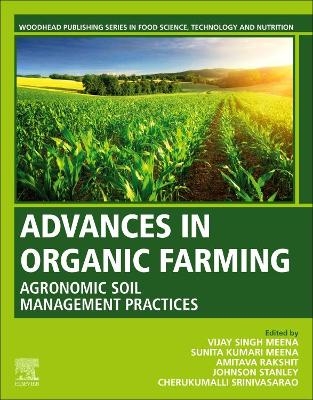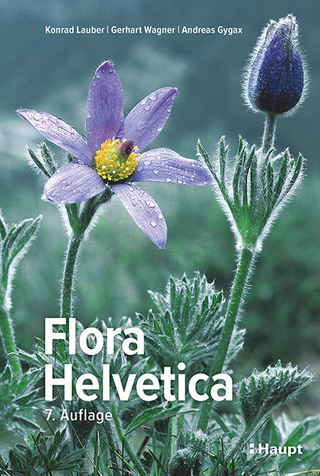
Advances in Organic Farming
Woodhead Publishing (Verlag)
978-0-12-822358-1 (ISBN)
In the simplest terms, organic growing is based on maintaining a living soil with a diverse population of micro and macro soil organisms. Organic matter (OM) is maintained in the soil through the addition of compost, animal manure, green manures and the avoidance of excess mechanization.
Dr. Vijay Singh Meena has made remarkable contributions in the field of agricultural research, aligning his efforts with the United Nations Sustainable Development Goals (SDGs). Particularly, his work focuses on evaluating and promoting climate-resilient technologies for diverse cropping systems, directly contributing to SDG 2 (Zero Hunger) and SDG 13 (Climate Action). His expertise lies in optimizing input usage, fostering carbon-neutral farming practices, and enhancing productivity and profitability in agriculture, which are integral to achieving SDG 2 by ensuring food security and promoting sustainable agriculture. Furthermore, his initiatives in evaluating climate-resilient technologies align with SDG 13 by addressing climate change impacts and promoting adaptation measures in agriculture. Dr. Meena's academic background in Soil Science and Cropping System Management, coupled with his extensive research experience, has equipped him with a profound understanding of cropping systems. His expertise in input optimization, quantitative cropping systems analysis, and soil health management has significantly contributed to improving livelihoods in South Asia, thus supporting SDG 1 (No Poverty) and SDG 2. Furthermore, Dr. Meena has been recognized for his scientific excellence, receiving prestigious awards such as the INSA Young Scientist Award and the IASWC Budding Scientist Award, which further highlights his contributions towards achieving the SDGs. In summary, Dr. Vijay Singh Meena's outstanding achievements, leadership abilities, and commitment to agricultural innovation directly contribute to advancing the SDGs, particularly SDG 2 (Zero Hunger) and SDG 13 (Climate Action), and make him a valuable asset in promoting climate-resilient agriculture and sustainable food systems. Ms. Sunita Kumari Meena - is an accomplished professional serving as an Assistant Professor at RPCAU (Dr. Rajendra Prasad Central Agricultural University) in Pusa, Bihar. With her expertise in the field of agriculture, she has made significant contributions to research and education, particularly in the areas of crop science and agricultural extension. As an Assistant Professor, Ms. Sunita Kumari Meena actively engages in teaching, mentoring, and guiding students pursuing agricultural studies. Her dedication to imparting knowledge and fostering a strong understanding of crop science among her students is commendable. She utilizes innovative teaching methods and practical demonstrations to ensure that students grasp concepts effectively. In addition to her teaching responsibilities, Ms. Meena is actively involved in research activities at RPCAU. Her research primarily focuses on crop improvement, agronomy, and sustainable farming practices. She conducts field trials, experiments, and data analysis to explore novel techniques for enhancing crop productivity, improving agricultural practices, and mitigating challenges faced by farmers. Amitava Rakshit is a faculty member of the Department of Soil Science and Agricultural Chemistry at the Institute of Agricultural Sciences, Banaras Hindu University. His research areas include nutrient use efficiency, simulations modelling, organic farming, integrated nutrient management, and bioremediation. His consulting capabilities are composting techniques, soil health management, and input quality control. He is currently the Chief Editor of the International Journal of Agriculture Environment and Biotechnology. He is a member of the Global Forum on Food Security and Nutrition of FAO, Rome, and the Commission on Ecosystem Management of International Union for Conservation of Nature. Dr. Stanley was born on 8th October, 1980 at Nagercoil, Tamil Nadu, India. He is graduated in Agriculture from Agricultural College and Research Institute, Killikulam and did his M.Sc and Ph.D in Tamil Nadu Agricultural University, Coimbatore. He joined Agricultural Research Service (ARS 2005) of Indian Council of Agricultural Research, New Delhi in 2008 and currently working as Senior Scientist (Agricultural Entomology) in ICAR-VPKAS, Almora, Uttarakhand. He is working on the integrated management of agricultural pests especially using bioagents and pheromones. He is also working on pesticide toxicity to non-target organisms i.e, biocontrol agents and other beneficial insects/ organisms. He is also working on pollinator management. He has successfully completed four research projects and five projects are currently being handled including projects of FAO, DST, NASF etc. He has published more than 40 research papers, 3 books and 6 book chapters. He has filed three patents and two of his technologies are commercialized for mass production and use. Born in Anigandlapadu, Krishna district of Andhra Pradesh on 4 October 1965. Educated at ZP High School, Anigandlapadu, 1975-80; SGS College Jaggaiahpet, 1980-82; Agricultural College, Bapatla, 1982-88; Indian Agricultural Research Institute, New Delhi, 1988-92; Tel-Aviv University, Israel, 1998-99; B.Sc (Ag) 1982; M.Sc(Ag) 1988; Ph.D 1992; Post-Doctoral 1999. Dr. Rao is currently working as a Director, ICAR-National Academy of Agricultural Research Management, Rajendranagar, Hyderabad, before that he has served as a Scientist, Indian Institute of Soil Science, Bhopal, 1992-98; Senior Scientist, Indian Institute of Pulses Research, Kanpur and Central Research Institute for Dryland Agriculture, Hyderabad, 1998-2006; Principal Scientist, 2006-13 and Project Coordinator, All India Coordinated Research Project for Dryland Agriculture, Central Research Institute for Dryland Agriculture, Hyderabad (CRIDA), Hyderabad, 2013-14; Deputation to International Crop Research Institute for Semi Arid Tropics, Patancheru, 2006-2008; Director, ICAR-Central Research Institute for Dryland Agriculture, Hyderabad, 2014-17.
1. Concept and global scenario of organic farming
2. Soil fertility in organic farming
3. Microbial community structure in organic farming and management
4. Microbial biostimulants under organic farming management
5. Conservative agricultural practices (CAPs) under organic farming
6. Role of unculturable microbes in organic farming production
7. Remediation of salt affected soils through microbes to promote organic farming
8. Organic plant nutrient, protection and production management
9. Towards the soil micronutrient availability under organic farming
10. Biofertilizers and biopesticides in organic farming
11. Towards the mitigation of biotic and abiotic stress through plant growth promoting rhizobacteria
12. Organic farming with management software
13. Outlooks of nanotechnology in organic farming management
14. Towards the quality and healthy organic production system
15. Organic oilseed production
16. Organic vegetable production and its impact on soil, environment and society
17. Towards the organic product certification
| Erscheinungsdatum | 23.08.2021 |
|---|---|
| Zusatzinfo | 75 illustrations (60 in full color); Illustrations |
| Sprache | englisch |
| Maße | 216 x 276 mm |
| Gewicht | 770 g |
| Themenwelt | Naturwissenschaften ► Biologie ► Botanik |
| Naturwissenschaften ► Biologie ► Mikrobiologie / Immunologie | |
| Naturwissenschaften ► Geowissenschaften ► Geologie | |
| Weitere Fachgebiete ► Land- / Forstwirtschaft / Fischerei | |
| ISBN-10 | 0-12-822358-8 / 0128223588 |
| ISBN-13 | 978-0-12-822358-1 / 9780128223581 |
| Zustand | Neuware |
| Haben Sie eine Frage zum Produkt? |
aus dem Bereich


